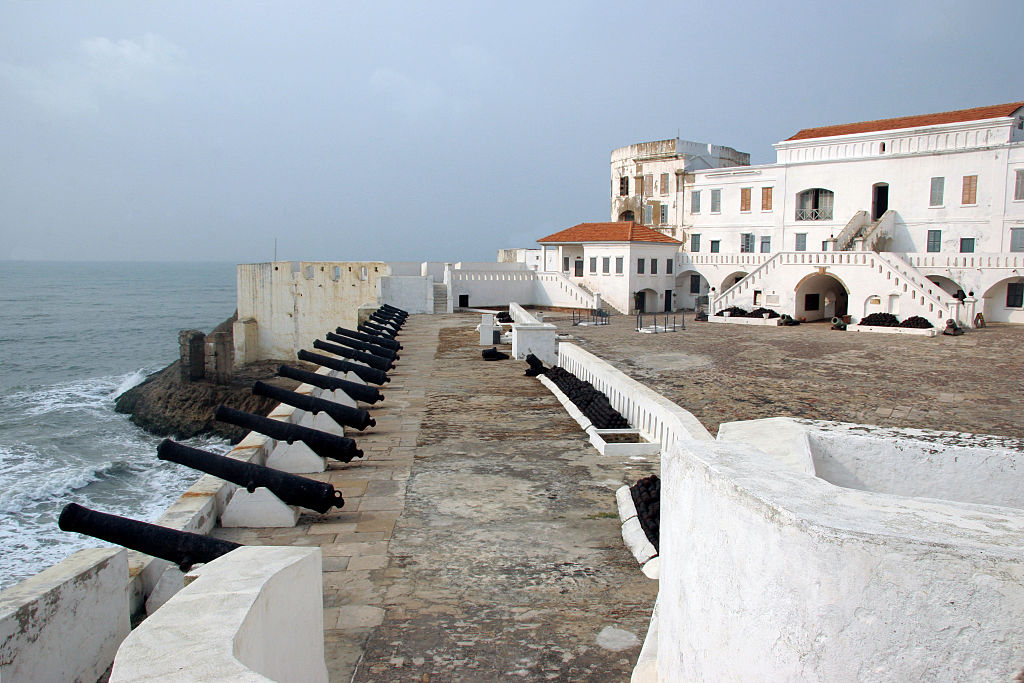Twerking Video Shows Women Dancing At Ghana Slave Site
‘For The Ancestors’: Video Shows Black American Women Twerking At Ghana’s Historic Slave Trading Post

Cannons at the Cape Coast Castle, former Ghanaian slave castle at Cabo Corso, Ghana, West Africa. | Source: Arterra / Getty
A video showing several women happily twerking at a location in Africa where slaves were once held in squalid dungeons before being shipped off into slavery in the U.S. and elsewhere is getting some negative attention on social media.
The footage from Cape Coast Castle in Ghana – apparently recorded on Juneteenth – was reposted elsewhere on social media with a disproportionate number of responses claiming that twerking at such a location is “disrespectful.” But the person whose social media account first posted the footage is pushing back on that notion.
The Instagram account for khaparisdiorrr — which touts Memphis and Atlanta in its bio and identifies itself in part as being operated by the CEO of a website that sells lingerie — has multiple posts documenting a recent, possibly ongoing trip to Africa, apparently as part of a birthday celebration for a Black American woman. Most of the posts from the trip show khaparisdiorrr along with her apparent friends and family enjoying themselves during festivities in the West African country.
One post, in particular, was filmed at the Cape Coast Castle, and showed multiple photos and videos from the historical location.
The post stands in stark contrast to the other celebratory posts from the trip, with multiple slides showing a woman looking somber as well as video footage of one of the dungeons where slaves were kept.
The sixth slide, however, takes quite the turn, with four women bending over to do the provocative twerk dance that has been embraced by younger generations.
“So today I got to experience The Slave Castle in Cape Coast! It’s wildddddd seeing how they did our ancestors! Treated them worst than animals!!” the post’s caption said. “It’s sad but of course we had to twerk for our ancestors cause PERIOD!!!!!! Happy Juneteenth from the motherland ❤️ I think everybody should go at least once in a lifetime.”
Backlash on social media was swift, with the influential Don Salmon Twitter account tweeting in part that “shaking your booty is disrespectful” and “black American sisters is disrespectful to the millions of our ancestors [who] were shipped into slavery.”
The Instagram account for khaparisdiorrr obviously caught wind of the backlash and responded in its IG Stories with a few choice messages for critics.
“How many 27 y/os y’all know traveling 17+ hours to a 3rd world country & experiencing their culture, giving away money to the kids & people in villages with no electricity & running water?!??” one of the IG Story installments said. “We gave away more money then [sic] we spent! Gave away clothes, overly tipped but wanna take a 7 second clip & make a huge deal out of it! Talk about the bigger picture!”
Apparently still on the defensive, the IG Stories continued by asking if the women should have done a different dance instead:
“If we was doing them Africans dances would that make y’all feel better? If we was doing the chicken head or the heel toe would that make y’all feel better?!?!”
A quick Google search found other videos from years past claiming twerking began in Ghana.
While those claims are unfounded, the origin of twerking certainly has its roots in Africa, scholarly research shows.
According to the Western perspective, twerking is a highly sexualized and provocative gyration of the hips and buttocks. It has even been added to Merriam-Webster’s Online Dictionary, which defines it as “sexually suggestive dancing characterized by rapid, repeated hip thrusts and shaking of the buttocks especially while squatting,” according to a blog post on Penn State University’s website. “But twerking isn’t new. In many West African cultures, it was an expression of joy and celebration performed at family gatherings and weddings.”
Vice President Kamala Harris visited Cape Coast Castle nearly three months ago. Perhaps her words from that fateful location might add some missing context to the fledgling social media controversy.
“There are dungeons here where human beings were kept — men, women, and children,” Harris said during her trip in March. “They were kidnapped from their homes. They were transported hundreds of miles from their homes, not really sure where they were headed. And they came to this place of horror — some to die, many to starve and be tortured, women to be raped — before they were then forcibly taken on a journey thousands of miles from their home to be sold by so-called merchants and taken to the Americas, to the Caribbean to be an enslaved people.”
SEE ALSO:
I Left America For Vacation In Africa And Never Came Back
The Significance Of ‘Wakanda Forever’ Honoring Cultural Legacies Beyond Africa
















